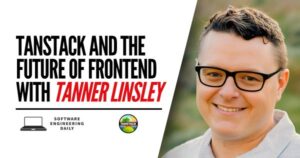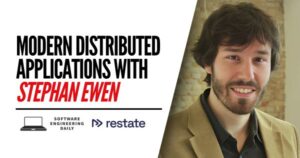Temporal with Max Fateev
Podcast: Play in new window | Download
Subscribe: RSS

There are countless real world scenarios where a workflow or process has multiple steps, and some steps must be completed before others can be started. Think of something as simple as cooking dinner. First you look up a recipe, then you write down the ingredients you need, you go shopping, and then you cook. These steps must be run in a certain order, and the state of the workflow must be tracked throughout. Workflow management is everywhere in the software world, and today it’s common for teams to engineer custom solutions. This makes sense, because creating a general-purpose solution for workflow management is a hard conceptual problem, and perhaps an even harder engineering challenge.
Maxim Fateev has a deep background engineering distributed systems and workflow management services at Google, Amazon, and Microsoft. In 2015, he joined Uber and helped create the open-source project, Cadence, which is an orchestration engine to execute asynchronous long-running business logic. The success of Cadence led Max to co-found Temporal, which is an open-source programming package for workflow execution. Max joins the show today to talk about the engineering challenges at Temporal, the concept of “durable execution”, how he organizes his engineering teams, and more.
 Sean’s been an academic, startup founder, and Googler. He has published works covering a wide range of topics from information visualization to quantum computing. Currently, Sean is Head of Marketing and Developer Relations at Skyflow and host of the podcast Partially Redacted, a podcast about privacy and security engineering. You can connect with Sean on Twitter @seanfalconer.
Sean’s been an academic, startup founder, and Googler. He has published works covering a wide range of topics from information visualization to quantum computing. Currently, Sean is Head of Marketing and Developer Relations at Skyflow and host of the podcast Partially Redacted, a podcast about privacy and security engineering. You can connect with Sean on Twitter @seanfalconer.Sponsors
When did scraping public web data become so hard?
Well it just got a lot easier with the tools from Bright Data, designed specifically for scraping at scale.
Bright Data has a new headful browser to easily make API calls and fetch any number of browser sessions, then interact with them using Puppeteer, Playwright, or even Selenium. Scale up to as many browsers as you need, and host them all on Bright Data’s award-winning proxy network.
Bright Data also unblocks sites for you with its CAPTCHA solvers and fingerprints.
Listeners of Software Engineering Daily get $25 of free credit on Bright Data’s platform. Go to softwareengineeringdaily.com/
Dealing with excessive context switching in your daily development tasks? Spending too much time looking for that code snippet you lost in the chaos of your workflow? You’re not alone.
Even if you do surface that snippet in your notes app or Teams chat, do you remember the key context behind it?
Use Pieces, an app developers use to manage development materials across their workflows. All saved snippets are auto-enriched with titles, descriptions, tags, related links, and even related people.
Pieces is seamlessly integrated with your IDE, browser, and collaboration tools, making it easy to save, search, share, reference, and reuse code snippets throughout your work-in-progress journey.
Pieces now has a built-in AI-coding assistant, Pieces Copilot, that generates relevant code tailored to your project. Set custom context with your personal code base, ask it who you can contact for a particular issue, and use it completely on-device, even without an internet connection.
Go to pieces.app to download the desktop application for free, and start boosting your productivity today.

















